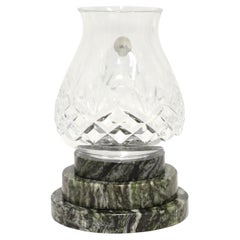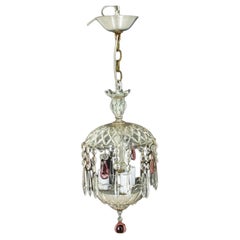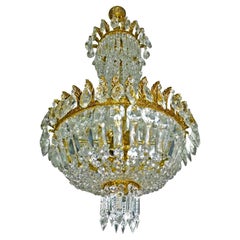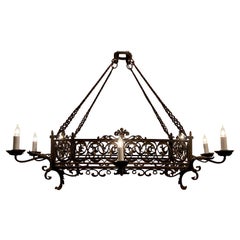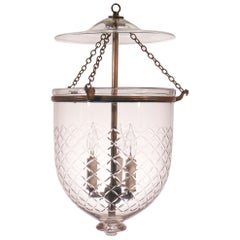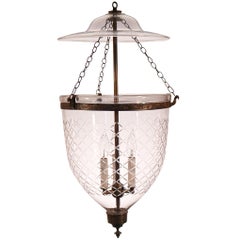Waterford Lantern
21st Century and Contemporary Irish Lanterns
Crystal, Marble
Mid-20th Century Georgian Chandeliers and Pendants
Crystal
People Also Browsed
Early 20th Century French Hollywood Regency Chandeliers and Pendants
Crystal, Bronze
Antique 19th Century French Chandeliers and Pendants
Wrought Iron
Late 20th Century Art Deco Chandeliers and Pendants
Crystal
Mid-20th Century French French Provincial Chandeliers and Pendants
Crystal, Wrought Iron
21st Century and Contemporary Georgian Chandeliers and Pendants
Crystal, Metal
1990s Northern Irish Jars
Crystal
Antique Late 19th Century Aesthetic Movement Chandeliers and Pendants
Brass
Vintage 1980s Irish Mid-Century Modern Table Lamps
Crystal, Brass
21st Century and Contemporary Czech Other Crystal Serveware
Crystal
21st Century and Contemporary Irish Centerpieces
Crystal
Late 20th Century Northern Irish Crystal Serveware
Crystal
20th Century More Art
Glass
Early 20th Century American Chandeliers and Pendants
Brass
Vintage 1970s Decorative Bowls
Crystal
Antique 1750s French French Provincial Chandeliers and Pendants
Iron
21st Century and Contemporary Chinese Barware
Crystal
Recent Sales
Antique Late 19th Century English Victorian Lanterns
Brass
Antique Late 19th Century English High Victorian Lanterns
Brass
Antique Late 19th Century English Victorian Lanterns
Brass
Antique Late 19th Century English Victorian Lanterns
Brass
Antique Late 19th Century English Victorian Lanterns
Brass
Antique Late 19th Century English High Victorian Lanterns
Brass
Antique Late 19th Century Unknown High Victorian Lanterns
Brass
Antique Late 19th Century English Victorian Lanterns
Brass
20th Century Georgian Chandeliers and Pendants
Crystal, Brass
Antique Late 19th Century English Victorian Lanterns
Brass
Antique Late 19th Century English Victorian Lanterns
Brass
Materials: brass Furniture
Whether burnished or lacquered, antique, new and vintage brass furniture can elevate a room.
From traditional spaces that use brass as an accent — by way of brass dining chairs or brass pendant lights — to contemporary rooms that embrace bold brass decor, there are many ways to incorporate the golden-hued metal.
“I find mixed metals to be a very updated approach, as opposed to the old days, when it was all shiny brass of dulled-out silver tones,” says interior designer Drew McGukin. “I especially love working with brass and blackened steel for added warmth and tonality. To me, aged brass is complementary across many design styles and can trend contemporary or traditional when pushed either way.”
He proves his point in a San Francisco entryway, where a Lindsey Adelman light fixture hangs above a limited-edition table and stools by Kelly Wearstler — also an enthusiast of juxtapositions — all providing bronze accents. The walls were hand-painted by artist Caroline Lizarraga and the ombré stair runner is by DMc.
West Coast designer Catherine Kwong chose a sleek brass and lacquered-parchment credenza by Scala Luxury to fit this San Francisco apartment. “The design of this sideboard is reminiscent of work by French modernist Jean Prouvé. The brass font imbues the space with warmth and the round ‘portholes’ provide an arresting geometric element.”
Find antique, new and vintage brass tables, case pieces and other furnishings now on 1stDibs.
Finding the Right chandeliers-pendant-lights for You
Chandeliers — simple in form, inspired by candelabras and originally made of wood or iron — first made an appearance in early churches. For those wealthy enough to afford them for their homes in the medieval period, a chandelier's suspended lights likely exuded imminent danger, as lit candles served as the light source for fixtures of the era. Things have thankfully changed since then, and antique and vintage chandeliers and pendant lights are popular in many interiors today.
While gas lighting during the late 18th century represented an upgrade for chandeliers — and gas lamps would long inspire Danish architect and pioneering modernist lighting designer Poul Henningsen — it would eventually be replaced with the familiar electric lighting of today.
The key difference between a pendant light and a chandelier is that a pendant incorporates only a single bulb into its design. Don’t mistake this for simplicity, however. An Art Deco–styled homage to Sputnik from Murano glass artisans Giovanni Dalla Fina (note: there is more than one lighting fixture that shares its name with the iconic mid-century-era satellite — see Gino Sarfatti’s design too), with handcrafted decorative elements supported by a chrome frame, is just one stunning example of the elaborate engineering that can be incorporated into every component of a chandelier.
Chandeliers have evolved over time, but their classic elegance has remained unchanged. Not only will the right chandelier prove impressive in a given room, but it can also offer a certain sense of practicality. These fixtures can easily illuminate an entire space, while their elevated position prevents them from creating glare or straining one’s eyes. Certain materials, like glass, can complement naturally lit settings without stealing the show. Brass, on the other hand, can introduce an alluring, warm glow. While LEDs have earned a bad reputation for their perceived harsh bluish lights and a loss of brightness over their life span, the right design choices can help harness their lighting potential and create the perfect mood. A careful approach to lighting can transform your room into a peaceful and cozy nook, ideal for napping, reading or working.
For midsize spaces, a wall light or sconce can pull the room together and get the lighting job done. Perforated steel rings underneath five bands of handspun aluminum support a rich diffusion of light within Alvar Aalto's Beehive pendant light, but if you’re looking to brighten a more modest room, perhaps a minimalist solution is what you’re after. The mid-century modern furniture designer Charlotte Perriand devised her CP-1 wall lamps in the 1960s, in which a repositioning of sheet-metal plates can redirect light as needed.
The versatility and variability of these lighting staples mean that, when it comes to finding something like the perfect chandelier, you’ll never be left hanging. From the whimsical — like the work of Beau & Bien’s Sylvie Maréchal, frequently inspired by her dreams — to the classic beauty of Paul Ferrante's fixtures, there is a style for every room. With designs for pendant lights and chandeliers across eras, colors and materials, you’ll never run out of options to explore on 1stDibs.
Read More
See How New York City Designers Experiment on Their Own Homes
There are many lessons to be learned from the lofts, apartments and townhouses of architects and decorators in Manhattan and beyond.
Canadian Designer Philip Mitchell Masterfully Balances Tradition and Glamour
Enriching rooms with layers of visual interest is key to the New York– and Toronto-based decorator’s signature style.
